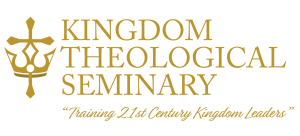Electives
Electives

Elective courses provide you with an opportunity to take courses outside of your required degree program. Electives also give you the ability to learn or gain a skill set in a particular area of study. The Kingdom Theological Seminary electives are designed to help you develop a custom based foundation for more effective ministry.

Elective courses provide you with an opportunity to take courses outside of your required degree program. Electives also give you the ability to learn or gain a skill set in a particular area of study. The Kingdom Theological Seminary electives are designed to help you develop a custom based foundation for more effective ministry.
Electives
KTS provides a plethora of elective courses with varying topics. In addition to the elective courses listed below, you can also choose to take any course from a master’s degree program as an elective. Take a moment to review all of the KTS elective courses below.
KINGDOM THEOLOGY CLUSTER
This course teaches the culture of the Kingdom of God. You will be introduced to the Seven Drivers of the Kingdom – the underlying beliefs and values that must be embraced by all Kingdom citizens. This course will explain each cultural value in detail for practical and daily Kingdom living.
This course contrasts the culture of the church (preaching, traditions, and next level living) and the culture of the Kingdom, as Jesus explained and taught it. You will learn the differences between the Kingdom and the church to optimize how to operate in the Kingdom of God. You will also learn how to live life as a Kingdom citizen in the church.
This course will discuss Jesus’ truth of the Kingdom of God in its full relevance. You will learn the structural and governmental realities that Jesus expected to take root within His citizens, but instead produced the church! This course will challenge all the traditional aspects of church that you have learned in your secular and Christian life!
The Doctrine of the Kingdom course provides an in-depth teaching on the foundational principles found in Hebrews 6:1-2. You will gain a sound understanding of these basic doctrines laying a solid foundation upon which the believer can build their spiritual lives.
This course presents a concise and in-depth understanding of the parables of Jesus used to teach the disciples about the Kingdom of God. You will receive a crucial understanding of the mysteries of the Kingdom of God as presented in parabolic form and their analogous spiritual counterparts that impact and influence your life daily.
This course teaches you how to live a Spirit-filled and focused life that manifests the supernatural. You will learn how to walk in the Spirit, being led by the Spirit, and being filled with the Spirit.
The Kingdom of God centers upon the worship of Christ the King. The Bible states in John 4:23-24, God is “seeking sincere worshippers that will worship in spirit and in truth.” The Kingdom Worship course teaches the heart of worship in the Kingdom. This course defines the place worship holds in the life of a Kingdom citizen.
This course discusses the reality of spiritual warfare that exists in the unseen, supernatural dimension. You will learn where the believer’s battles take place as well as what we, as believers, strive and struggle against. This course will teach you the weapons of warfare they possess as believers in Christ.
This course will introduce you to the order of the Kingdom of God and the church. You will learn the mission of the church as the embassy of the Kingdom of God. You will also learn the preeminence of the constitution of the Kingdom of God (Bible), the benefits of honoring Christ the King, and how to live in His Kingdom.
This course will enhance your understanding of biblical vision vs. secular vision and provide insights concerning the Great Commission and the preaching of this gospel of the Kingdom around the world as a witness.
This course addresses the ethics and values that are associated with living in the Kingdom while living with vision. Taking a comprehensive look at some of the most basic and fundamental principles of the Kingdom as taught by the Lord Jesus Christ, this course will assist you in understanding the principles that are necessary to have what the book of Joshua refers to as “good success.”
This course discusses God’s sovereign will and plan for humanity according to the scriptures. The Kingdom Eschatology course will teach you about the signs of the end times and what will happen to the Christian church during this time. You will also learn how to maintain your walk with God during the perilous end times.
This course will enhance your understanding of the Kingdom of God, the church, and the issues that every believer must be aware of as Kingdom citizens.
Students will gain an understanding of the Kingdom concerning modern cultural and theological issues such as the Kingdom of heaven, eschatology, racial tension and reconciliation, globalization and colonization, the culture and the call, the purpose of the church, and the Kingdom-driven life. This course will revolutionize your ability to make sense of the world, the role of the church, and the efficacy of the Kingdom message as the answer to the ills of our culture.
Culture cannot be separated from the study of scripture. Human beings all have differing and varied cultures that give mores and ways of life, appropriate behaviors and expressions that give meaning to a people. In the same way, the Kingdom of God has a culture. This course will explore the origins of Kingdom culture, how the culture of the Kingdom has been distorted, and greater depth and understanding of Kingdom culture.
This course explores the current state of Christianity around the world. Students will explore the origins of Christianity and its spread through colonization. Then student will explore the globalization of the Kingdom of God in Asia, Israel, South and North America, Europe, Australia, and Africa. The demonstrations of the Kingdom of God, when faith is present, will also be explored.
With the rise of secular humanism and the lack of sound doctrinal teaching, many believers are confused and struggling to understand how to live out their Kingdom lives. This course will teach students about the Holy Spirit, His Godship, His gifts, and how He works His power in and through your life. Students will be introduced to the basics of Kingdom living, as demonstrated in the lives of God’s people from the Older to the Newer Testament. These enriching insights will transform students’ understanding of the Holy Spirit and provide invaluable preparation to live a victorious and powerful life in the Kingdom!
PRACTICAL THEOLOGY CLUSTER
This course is an introduction to Christian apologetics and its relationship to evangelism. The course will teach the biblical, theological, and historical foundations of Christian apologetics. Additionally, the course will serve as a primer for cultural exegesis and cultural hermeneutics. The goal is to equip students with the critical analytical tools to engage contemporary cultural issues as related to matters of faith. Topics include comparative worldview, science and faith, secularism, aesthetics, and ethics. Through required and recommended readings, online discussions, and lectures, the student will gain a clearer understanding of how to navigate and respond pastorally to some of today’s most challenging issues while at the same time formulating a cohesive Christian response to them.
This course will provide a practical perspective to biblical Kingdom Education. Students will focus on what it means to have a relationship with the loving God of the Universe and the method of passing on His precepts to our children and grandchildren. The course will deal with large issues like philosophy, methodology, curriculum, and evaluation, but in such a way that they will be easily understood and mastered by anyone with a willing and teachable heart. You will also gain practical tools like overviews, lesson plans, assessments, and access to many resources for your Kingdom education utilization and application. The goal is that you use this as a beginning point to develop your own enriched biblical curriculum using whatever starting point you have at hand. This course is designed to assist you in how to make any standardized curriculum Kingdom rich. If you don’t have a curriculum, in this course, you will teach you how to develop one. If you are searching for something more than just the traditional Christian curriculum, then this course is for you!
This course provides a framework for developing vital and faithful Christian worship by exploring the biblical and theological foundations of worship. This course will review the ways praise in the church has been shaped over the centuries and analyze today’s worship spectrum. Key elements in the practice and leadership of worship will be explored including the order of worship, the role of prayer and music, and models of collaborative worship planning.
This course examines the roles, function, and theological considerations for the practice of pastoral ministry. Ministry identity, call, and foundational pastoral tasks will be examined and emphasis will be made on the practical matters of ministry.
This course explores the importance of sharing the gospel message through the power of the Holy Spirit. This course will examine the release of God’s power through signs and wonders to refresh, renew, heal, and equip His people. Students will be taught the importance of being filled with and being obedient to the Spirit so they might more effectively evangelize the lost and withstand spiritual opposition.
SOCIAL JUSTICE & CHRISTIANITY CLUSTER
This course is designed to increase students’ awareness, knowledge, and critical skills related to diversity, human rights, and social and economic justice. The topics of this course include developing a framework for 1) engaging diversity and differences in social work practice and 2) advancing human rights and social and economic justice. We will explore the knowledge base that underlies the skills needed to work towards justice. This base includes types and sources of power, multiple social locations, social constructions, social processes, social identities, conflicts, and how they interact. A major emphasis will be placed on developing skills in critical contextual thinking and analyses and in praxis, learning to use knowledge and theory to recognize and critique underlying assumptions and paradigms, and working for change. Multiple kinds of important boundaries will be examined—across groups, between organizations and system levels, and within and between people per intersecting social locations.
This course traces the historical significance of the rise and development of black theology as an important conversation for the black church. It also opens the avenues for honest dialogue between black and womanist theologians and the black pastorate. This course will offer a fresh theological outlook by demanding a new look at the church’s essential mission. For decades, the black church and black theology have held each other at arm’s length. Black theology has emphasized the role of Christian faith in addressing racism and other forms of oppression, arguing that Jesus urged His disciples to seek the freedom of all peoples. Meanwhile, the black church, even when focused on social concerns, has often emphasized personal piety rather than social protest. With the rising influence of white evangelicalism, biblical fundamentalism, and the prosperity gospel, the divide has become even more pronounced.
PRACTICAL MINISTRY CLUSTER
This course explores the importance of sharing the gospel message through the power of the Holy Spirit. This course will examine the release of God’s power through signs and wonders to refresh, renew, heal, and equip His people. Students will be taught the importance of being filled with and being obedient to the Spirit so they might more effectively evangelize the lost and withstand spiritual opposition.
LEADERSHIP CLUSTER
Our ability to lead and manage ourselves is essential to success in life. In this course, you will learn critical skills, and gain valuable tools, for understanding and leading themselves and engaging with others. Topics include: emotional intelligence and
increasing your EQ; self-leadership and enhancing one’s skills to discover ones why and purpose, self-awareness; self-knowledge through self-discovery assessments; personality typology and the ability to differentiate personality traits from others;
empathy; and relational understanding within community.
This course will provide the learner with the necessary skills and tools to become a true servant leader. The servant leadership model can positively impact human satisfaction in any organization, thereby increasing its productivity. Putting people in the first place, a servant leader deflects attention from himself and empowers every member of the team. By empowering others, the leaders find their power and become the place of authority.
Traditional models and theories of leadership are becoming increasingly ineffective and obsolete in the modern, competitive, and global context. Thus course will explore the leadership movement that is replacing top-down, authoritative styles of leadership with those that place as much emphasis on the act of followership and emphasize emotional intelligence, empathy, and other often overlooked human factors that impact the leader-follower paradigm. Students will examine the principles and practices that contribute to the incarnational style of leadership, including the traits of incarnational leadership, the relationship between leaders who adopt this style and their followers, and the contexts in which this leadership style should be employed.
More and more leaders and companies recognize that they must proactively disrupt, or risk being disrupted. But business-as-usual leadership, where big visions are followed by detailed road maps and action plans, do more than stifle disruptive innovation. They represent liabilities to success. Leading disruptive change involves adopting principles that fall outside the traditional training of managers and leaders. In this course, you will examine how disruptive change occurs because of innovation in industries, change in the company’s structure, or transformation in business models. These fundamental changes disrupt the way an organization conducts business.
THE MINISTRY OF THE HOLY SPIRIT CLUSTER
This course will provide the learner with the necessary skills and tools to become a true servant leader. The servant leadership model can positively impact human satisfaction in any organization, thereby increasing its productivity. Putting people in the first place, a servant leader deflects attention from himself and empowers every member of the team. By empowering others, the leaders find their power and become the place of authority.
Traditional models and theories of leadership are becoming increasingly ineffective and obsolete in the modern, competitive, and global context. Thus course will explore the leadership movement that is replacing top-down, authoritative styles of leadership with those that place as much emphasis on the act of followership and emphasize emotional intelligence, empathy, and other often overlooked human factors that impact the leader-follower paradigm. Students will examine the principles and practices that contribute to the incarnational style of leadership, including the traits of incarnational leadership, the relationship between leaders who adopt this style and their followers, and the contexts in which this leadership style should be employed.
THE BUSINESS OF CHURCH CLUSTER – COMING SOON
Traditional models and theories of leadership are becoming increasingly ineffective and obsolete in the modern, competitive, and global context. Thus course will explore the leadership movement that is replacing top-down, authoritative styles of leadership with those that place as much emphasis on the act of followership and emphasize emotional intelligence, empathy, and other often overlooked human factors that impact the leader-follower paradigm. Students will examine the principles and practices that contribute to the incarnational style of leadership, including the traits of incarnational leadership, the relationship between leaders who adopt this style and their followers, and the contexts in which this leadership style should be employed.
FINANCIAL MANAGEMENT CLUSTER
This course teaches the importance of wealth building through asset accumulation. It is designed to help the student discover their current financial position and also how to get to their ideal financial position or where they desire to be financially in the future.
This course will empower you with the basic tools of both micro- and macro-economics in order to provide you with the necessary knowledge to understand the basics of investments and entrepreneurship.
This course teaches you how to understand the basics of investments, stocks, bonds, mutual funds, annuities, derivatives, and more. This knowledge will assist you in providing a more prosperous financial future for you and your family.
This course is designed to help you understand your financial status by reading financial statements, bank statements, balance sheets, statement of income, and cash flow statements, etc. This skill will safeguard you against getting cheated out of your money!
STEWARDSHIP CLUSTER – COMING SOON
ORGANIZATIONAL LEADERSHIP CLUSTER
What does it take to lead an organization? What systems are required and what roles must exist? What issues have the potential to undermine the success of an organization and destroy it from the inside out? What leadership principles have become obsolete? Which principles continue to stand the test of time and, if adhered to, ensure organizational success? This course examines the issues that most commonly impact organizations and provides insight and guidance into possible solutions.
In today’s competitive and fast-paced business environment, change is a constant. Thus, it is imperative that leaders, managers, and front-line employees learn how to embrace and thrive in a business context that is in constant flux. How is change implemented and managed? What best practices should be employed to successfully influence change? What models should leaders utilize to lead change initiatives within their organizations? This course examines both effective and ineffective cases of organizational change and the latest, evidence-based theories of organizational change.
No one will argue that in today’s competitive market, the ability to differentiate one’s product from the rest of the field is key to long-term business success. However, many times, a great product just isn’t enough. The reality is that in a world where quality products abound and worldwide shipping and receipt times are a fraction of what they used to be, the one factor that can cause a business to sink or swim is service. It is in this arena that the Walt Disney Company has set itself apart. This course provides an in-depth analysis of the “Disney Experience” and provides a solid framework upon which to create the customer service experience you wish to achieve within your business.
PASTORAL COUNSELING AND COUNSELING MINISTRY CLUSTER – COMING SOON
TECHNOLOGY IN MINISTRY CLUSTER – COMING SOON
JEWISH BACKGROUND CLUSTER
This course will explain the beliefs, traditions, and history of the Jewish faith. Students will engage the central Jewish texts, including the Tanakh, the Talmud, and the rabbinic and contemporary Midrashim. This course will examine three fundamental aspects of Judaistic beliefs: 1) the nature of God and the divine as understood by the Jews, 2) where humankind stands in view of Judaism, and 3) the historical account of Judaism and its beginnings in Israel.
This course will help solidify the connection between the Old Covenant under Moses and the New Covenant in Christ. In this course, we will examine the histories of both the Tabernacle and the Temple(s) from both biblical and external sources as well as comparisons and explanations of their surroundings and contents. To understand the tabernacle and the temple, then, is to understand how we are brought into God’s family through the sacrifice of His only Son, Jesus. Indications of the Person and the work of Jesus Christ will be shown from the tabernacle and from both the ancient and modern temples of God.
This course will explore God’s redemptive plan as unveiled through the Feasts of Israel. In this course, students will learn the details of each of the Feasts, their fulfillment in Messiah, and their implications for your life. These appointed times of God are still relevant for our lives today as they illustrate what the Messiah has done for us, and what He has yet to do! This course will also examine how each feast and the Levitical Law points to our Redeemer and the loving and saving grace of Jesus Christ. We will examine the literal observance and prophetic applications of each of the seven feasts.
In this course, contemporary Judaism is presented in all its rich diversity, including both traditional and modern theologies as well as secular forms of Jewish identity. Jewish theology will be examined both historically and in terms of contemporary issues. While the focus of the course will be on developments that have taken place in the past two hundred years, they are set against a historical background as expressed in the Bible. The course will also include a description of the Jewish people as it exists in today’s world. Students will study the unique concept of Jewish peoplehood and its survival over the centuries in the face of many challenges. There will be a review of the key texts, followed by studies of the different interpretations of the religion, the ways that life is lived out both in the home and in the community, and the goals of Jewish life and faith.
This course will explore the narratives and social worlds of ancient Jewish and Christian apocalyptic literature from its roots in the Mesopotamian texts and the Hebrew prophets to their expressions in the biblical apocalypses of Daniel and Revelation as well as the lesser known apocalyptic works and traditions found in the Jewish pseudepigrapha and the Dead Sea Scrolls. The main objective of this course is the investigation of the conceptual world of Jewish apocalypticism and its formative value for early Christian theology.
BLACK CHURCH DENOMINATIONAL HISTORY CLUSTER – COMING SOON
AFRICA AND CHRISTIANITY CLUSTER
This course examines the African roots of Christainty from a biblical perspective examining the importance of Africa in both the Older Testament and the Newer Testament. The course will examine the rich, historical roots of African Christianty as one of the oldest forms of Christianity today. The course will provide the student with over 2,000 years of African contributions from the origin of Christianity to its present. Students will also explore how the African church has faithfully testified of the power and diversity of God’s Kingdom.
BIBLE COURSES
The prerequisites to taking electives from the Bible cluster are Old Testament Survey I and II Advanced, New Testament I and II Advanced, Hermeneutics, and Exegesis.
OLDER TESTAMENT CLUSTER – COMING SOON
NEWER TESTAMENT CLUSTER – COMING SOON
GENERAL EPISTLES AND REVELATION CLUSTER – COMING SOON
THE KINGDOM AND YOU CLUSTER
This course will enhance your understanding of the Kingdom of God, the church, and the issues that every believer must be aware of as Kingdom citizens.
Students will gain an understanding of the Kingdom concerning modern cultural and theological issues such as the Kingdom of heaven, eschatology, racial tension and reconciliation, globalization and colonization, the culture and the call, the purpose of the church, and the Kingdom-driven life. This course will revolutionize your ability to make sense of the world, the role of the church, and the efficacy of the Kingdom message as the answer to the ills of our culture.
Culture cannot be separated from the study of scripture. Human beings all have differing and varied cultures that give mores and ways of life, appropriate behaviors and expressions that give meaning to a people. In the same way, the Kingdom of God has a culture. This course will explore the origins of Kingdom culture, how the culture of the Kingdom has been distorted, and greater depth and understanding of Kingdom culture.
This course explores the current state of Christianity around the world. Students will explore the origins of Christianity and its spread through colonization. Then student will explore the globalization of the Kingdom of God in Asia, Israel, South and North America, Europe, Australia, and Africa. The demonstrations of the Kingdom of God, when faith is present, will also be explored.
With the rise of secular humanism and the lack of sound doctrinal teaching, many believers are confused and struggling to understand how to live out their Kingdom lives. This course will teach students about the Holy Spirit, His Godship, His gifts, and how He works His power in and through your life. Students will be introduced to the basics of Kingdom living, as demonstrated in the lives of God’s people from the Older to the Newer Testament. These enriching insights will transform students’ understanding of the Holy Spirit and provide invaluable preparation to live a victorious and powerful life in the Kingdom!
CHURCH HISTORY CLUSTER – COMING SOON
ADDITIONAL PROGRAM INFORMATION

- 2 courses per session (one session is equivalent to 8 weeks)
- 12 courses per year
- With special approval you can get access to take 15 courses per year
- Midterm
- Final exam
- Reflection papers from weekend lectures (4 per course)
- Final paper
- Weekly “Think Tank” discussions

How Tuition is Estimated
- For the Master of Divinity degree, courses are $425 per course.
For additional tuition and fees information, visit Tuition & Fees.

Upon receipt of your application and application fee, your application will be reviewed by the Academic Committee. Following the recommendations of the Academic Committee, an Admission Counselor will contact you via email with the results and follow up actions.




